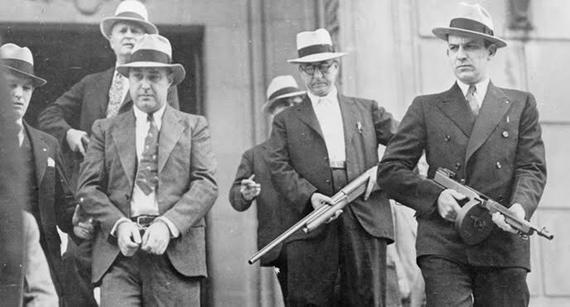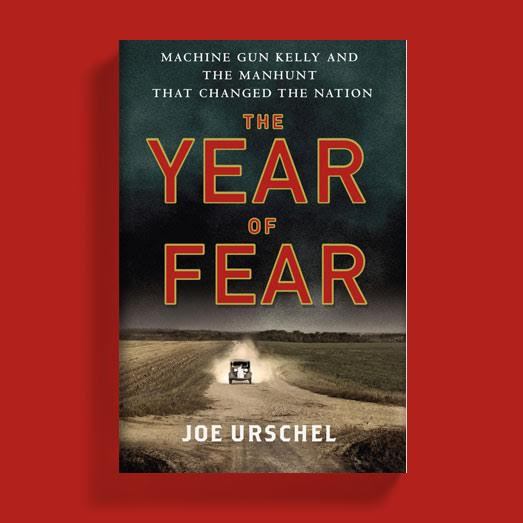The course of history is not always altered by great events or outsized personalities achieving the extraordinary. Often it is the bold and clear-headed actions of ordinary citizens taking decisive action at the moment of crisis that makes an outsized impact on the course of events. One such action occurred in the beastly hot summer of the worst year of the nation's Great Depression as a sense of lawlessness prevailed and desperation spread.
It happened in the early morning hours of July 23, 1933, as J. Edgar Hoover lay asleep in his home in Washington, DC. At that time, he had only tentative hold on the job he had come to know and love. He was Director of the United States Department of Justice Bureau of Investigation. At age 36, he was thought by many to be too young, too inexperienced and too politically unconnected for the job most people in government considered to be barely more than a political patronage appointment. To that point, he hadn't done much to prove them wrong.
His team's investigation of the 1932 Lindbergh baby kidnapping case had been a laughable failure. The case had dragged on with no resolution or notable progress in the 16 months since then-President Herbert Hoover had tapped him to lead the federal efforts to solve the case and find the kidnappers. His initial efforts to get involved in the investigation had been rebuffed by the New Jersey State Police and other law enforcement agencies, who flat out refused to share information, and dismissed his men as inept federal interlopers. Charles Lindbergh himself was barely co-operative.
Hoover's over-reaching in the capture and arrest of an escaped federal prisoner had resulted in the mass murder of four law enforcement officers, including one from his bureau, and the prisoner himself. The machine gun assault had taken place in June of 1933, a month earlier, in the parking lot of Kansas City's busy Union Station in full view of the train station's bustling crowds. Its perpetrators were still at large.
Not only was his competence being called into question by the national press, but his masculinity was as well as they mocked his gait and dandified attire. The new president's wife was said to loath him, and he'd just barely escaped a sacking by Franklin Delano Roosevelt's first choice for Attorney General, Thomas Walsh, who died unexpectedly before assuming the office.
But Hoover was about to receive a phone call that would turn his fortunes around. The call would deliver to Hoover the most effective and co-operative witness in the history of the agency's war against crime. It would set into motion the biggest manhunt in the nation's history and lead to a spectacular trial that would transfix the country and transform the bureau.
The events would unleash a barrage of publicity that would ultimately put the beleaguered director on course to become not only the most powerful lawman in the nation's history, but the most admired as well. Within ninety days, Hoover would go from a man whose head had been on the political chopping block, to the star performer of the new administration's ambitious plans.
Hoover could not have realized all of this as his bedside telephone rang on that Sunday at 2 a.m. But his life was about to change, and history was about to be made.
Just weeks earlier Hoover had established the country's first national crime hotline—a special number that anyone could call to be put through immediately to the Justice Department headquarters in Washington, DC. It was intended to be used for reporting kidnappings—a heinous crime that was occurring with alarming regularity throughout the country. Hoover hoped his hotline would tip his agents off quickly so they could get on the scene without delay and get control of the investigation before the local authorities could lock things up and freeze them out. So eager was he to get news quickly, that he instructed the telephone operators at the bureau to put calls through to a special line he had installed in his home.
When it rang, rousing Hoover, it brought news of the kidnapping of a wealthy Oklahoma oilman, who'd been snatched off his sun porch just hours earlier. The call was from the victim's wife, who'd read a story about the special hotline just days earlier in Time magazine. Hoover dispatched his men almost immediately.
Within days of his release after the largest ransom in the nation's history had been paid, the victim, Charles Urschel (no relation to the author), led the bureau's agents back to the farm in Texas where he had been held captive, resulting in the arrest four members of the crew that held him captive and legendary bank robber Harvey Bailey, who was hiding out on the farm.
From there they would chase the actual kidnappers, George "Machine Gun" Kelly, his wife, Kathryn, and partner Albert Bates over 20,000 miles and 16 states before their eventual capture. After a spectacular and melodramatic trial that was covered in great detail by members of the press from around the world, the Kellys, Bates, Bailey and Robert and Ora Shannon, who owned the farm where the victim was held, all would be convicted and sentenced to life in prison. George Kelly, Bates and Bailey would eventually end up serving their time on Alcatraz, the federal penitentiary that was opened a year later as a place to house "criminals of the vicious and irredeemable type," in the words of then-Attorney General, Homer Cummings.
Citing the Urschel kidnapping case, Cummings then went before Congress and argued for an expansion of power for the Justice Department's Bureau of Investigation. At the time, the Bureau was basically limited to the pursuit of kidnappers, interstate auto thefts and those transporting women across state lines for the purpose of prostitution. He wanted federal laws against racketeering, the transportation of stolen property across state lines, flight across state lines to avoid prosecution, robbing banks operating under the Federal Reserve System, assault on a Federal officer, regulations on the sale and manufacture of machine guns, and other laws that would expand the enforcement powers of the Bureau. He also wanted the death penalty for kidnappers. With the passage of 1934's Crime Bill, he would get virtually everything he wanted.
A year later Hoover and Cummings would go to the president and suggest a new name for their bureau—a name that would distinguish it from other federal agencies that also had investigative bureaus. They wanted to call the Justice Department's bureau, the Federal Bureau of Investigation. Roosevelt liked the idea, and on March 22, 1935, the name formally took effect.
J. Edgar Hoover, its Director, who less than 2 years earlier was in danger of losing his title, would hold on to it for another 35 years until he died in his sleep on May 2, 1972. Charles Urschel and his wife Berenice would fade into the background, largely forgotten. But had they not taken the actions they did—standing up to the threats of their captors and co-operating with the federal authorities—Hoover would have been denied the landmark trial on which he launched his career, and George "Machine Gun" Kelly would have remained in relative anonymity as a bit player in the saga of America's gangland.
Joe Urschel is the Executive Director of the National Law Enforcement Museum and author of The Year of Fear: Machine Gun Kelly and the Manhunt that Changed the Nation.


